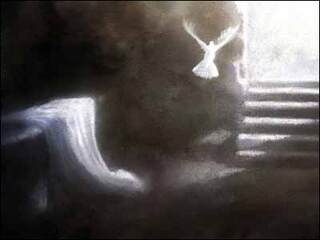
The stranger delved into the Hebrew scriptures that we call the Old Testament. These would have been familiar to those two men. But now it was as if they were hearing them for the first time. Everything in those passages shed light on Jesus, the person they thought they had known and understood but who now appeared a stranger to them. They were so intrigued that when they reached the village of Emmaus, their destination, they asked the man to stay with them.
As the spiritual writer, Henri Nouwen points out, the man who was their guest now becomes the host. He takes bread and breaks it to share with them and suddenly they realise whose company they are sharing. In that moment of recognition he disappears from their sight but they no longer feel bereft. They acknowledge how, when he was speaking to them about the scriptures, their hearts were burning within them. Also they share their recognition of Jesus at the breaking of bread. Filled with enthusiasm they return to Jerusalem to find that others too had encountered the risen Lord.
This strange but beautiful passage from Luke’s gospel invites us to consider why it might have been that the men failed to recognise Jesus. When Jesus calls them “foolish men” he is not condemning them but he is drawing a line under an old story that was no longer a source of life. Their expectations of Jesus as an earthly liberator had to die with Jesus on the cross. When Jesus, risen from death, met his disciples once again they had to get to know him as if for the first time. No wonder they failed to recognise who it was. Jesus is now leading them into a much greater reality and a vision of the future that they could never have dreamed of.
This passage invites us to consider whether our own ideas about Jesus are too small. One thing is for sure: Jesus will never be contained within our own limited outlook on life and the world. Mary Magdalene found she could not cling to him and neither could the two disciples on the road to Emmaus keep him as their own personal house guest. Christ is always leading us beyond the narrow horizons of our worldly vision.
In every Eucharist we are invited to bring our story before God, just as the disciples on the road poured out their story of loss and sadness. We come to acknowledge our failures, our disappointments, our sadness and fears and to hear the reassurance that God forgives us and loves us. We come to hear the word of God, not just as a familiar old story, but as if for the first time as it tells the story of Jesus but also, in some way, our own story too. Then we come to share in the action of Jesus himself, breaking the bread and sharing his own life among us. Do not our hearts burn within us? Do we not recognise who it is that comes alongside us on our journey and as we join together as the Church, distanced as we might be at this time?
Cleopas and his companion came to know that the journey they had shared with Jesus really did not end in death. As much as we might somehow like to return to a time in the past when we imagine everything to have been okay, we know we cannot do this. For the disciples, the cross and the empty tomb meant that they had to say goodbye to all that. But the wonderful thing is that by his resurrection, Our Lord heals our memories and opens up for us a future of hope and of new life. At this terrible time, let us keep that in our sights.
Let us pray: “Stay with us, Lord, on our journey and be our companion on the way. In your mercy, increase our hope and inflame our hearts, so that we may recognise you in the scriptures and in the breaking of bread. Amen.”
Father Richard
 RSS Feed
RSS Feed